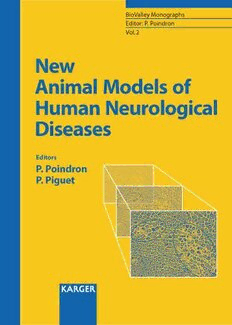
New Animal Models of Human Neurological Diseases PDF
109 Pages·2008·3.469 MB·English
Most books are stored in the elastic cloud where traffic is expensive. For this reason, we have a limit on daily download.
Preview New Animal Models of Human Neurological Diseases
Description:
Aimed at studying human diseases, animal models emerged in the 1800s and underwent a real boom during the last century. Whether isomorphic or homologous - a categorization based on the extent of similarities between human and animal diseases, animal models have led to tremendous progress in therapeutics. Following an introduction about history and ethical issues of animal models, this article describes their main features. What are the different kinds of animal models? What characterizes induced (experimental) disease, spontaneous disease, transgenic disease, negative disease and orphan disease models? What are the limits and pitfalls of animal models? What parameters should be taken into consideration for a better predictivity of the models? Various examples taken in the discipline of neuroscience, and even psychiatry, illustrate the difficulties, success and concerns of animal modelling.
See more
The list of books you might like
Most books are stored in the elastic cloud where traffic is expensive. For this reason, we have a limit on daily download.
